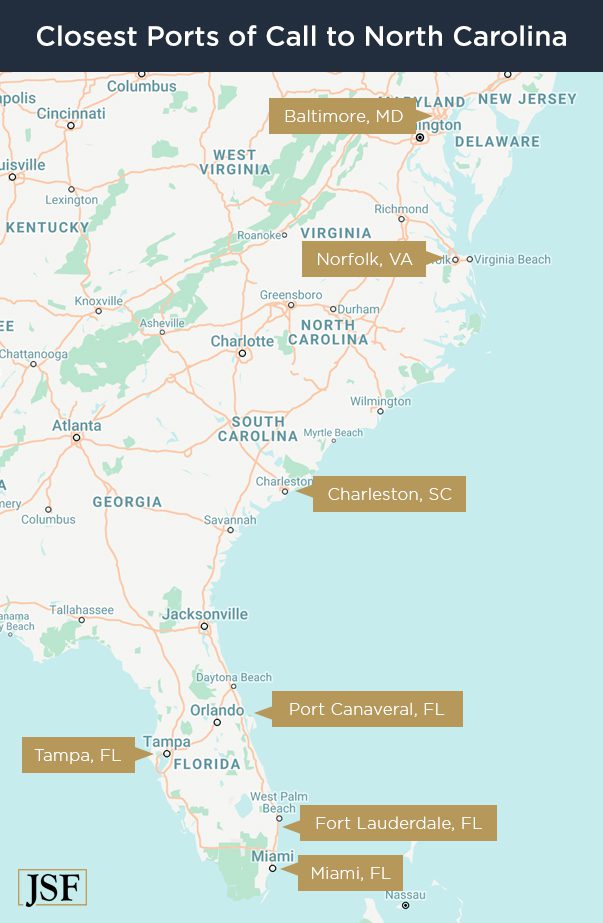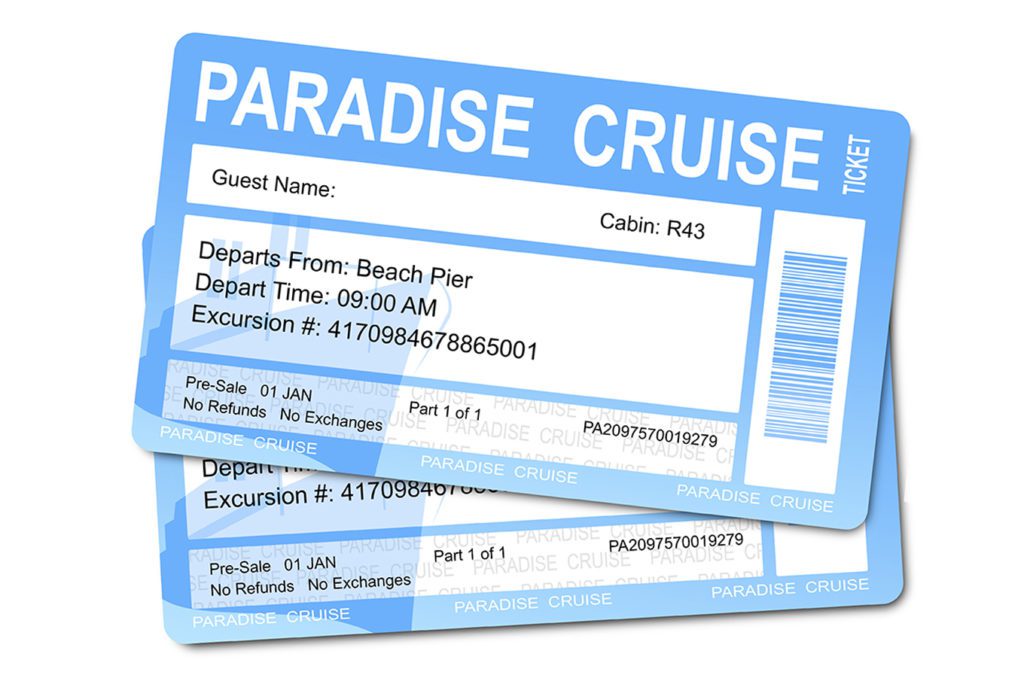Sometimes, your cruise isn’t smooth sailing. What if you’re injured on the trip?
It happens more than you think, and seeking compensation can be tricky. Here are the facts.
Cruise Ship Accident Lawyers – Injured at Sea?
Getting injured on a cruise ship isn’t just a quick way to ruin your vacation. It could be difficult to get compensated for an injury that wasn’t your fault. Because most cruise lines are headquartered outside the U.S., and many of the incidents on those vessels happen over the ocean, knowing how to navigate the legal hurdles is best left to a cruise ship accident lawyer.
And as the cruise industry grows, and with it the number of passengers, injuries will naturally become more common. The ocean cruise line industry continues to grow steadily every year – more than 6.5% annually from 1990-2020. With newer, larger, more opulent vessels and more port options, the attraction to cruising is understandable. For Carolinians, the ports of call are as close as Norfolk, Virginia; Charleston, South Carolina; and Baltimore, Maryland, with numerous ports in Florida.
Cruise Ship Incidents That May Cause Injuries
What some don’t realize is how easily dream cruises can turn into terrible experiences.
There are many ways this can happen. Some start with the ship’s behavior, movement, and equipment:
- Sinking
- Running aground
- Capsizing
- Collisions with land, rocks, docks, bridges, icebergs, etc.
- Terrorist and pirate attacks
- Virus outbreaks such as legionnaire’s disease and norovirus
- Unexplained deaths and drownings on land tours/shore excursions
- Sexual assaults of minors by Disney cruise ship crew members
Any of these incidents creates the potential for passengers to be injured or killed. Some of these cruise ship incidents, reasonably, are unavoidable. Many, however, are the result of mistakes, oversights, lack of training, lack of maintenance, or outright negligence of the ship’s operators, officers, or crew.
For example, the 2013 generator fire aboard the Carnival ship Triumph. Dubbed the “poop cruise” by the media, the fire caused electrical and plumbing systems to shut down. More than 4,000 on board were stranded at sea for four days before the ship could be towed to shore. North Carolina Public Radio reported one woman’s horrifying experience:
“… some passengers panicked. People were hoarding food — boxes and boxes of cereal, grabbing cake with both hands,” she said. “Toilets stopped working and the 3,143 passengers and 1,086 crew had to urinate in sinks and eventually red plastic bags.” She saw sewage dripping down walls. “Sometimes people slipped on it,” she said. Soon, the ship began to smell. “It was like a hot port-o-potty.” And when the ship tilted, “it would spill.”
Shockingly, the Triumph crew knew of the potential fire hazard but set sail regardless, according to CNN. That’s an example of negligence.
How Common Are Cruise Ship Incidents?
There were 101 onboard fires between 2005 and 2013. Six cruise vessels sunk by hitting the sea bottom/rocks and reefs or icebergs from 1990–2012. The most notorious of these was the Costa ship Concordia, which left 33 dead. Again, the cruise ship industry does not make it easy to compile statistics, which is a primary reason more recent statistics are not easily found.
Injuries During Cruises That Are Not Ship-Related
The other incidents aboard ships that can put you at risk are more based on the people, conditions on board, and other variables rather than an incident involving the vessel itself.
- Terrorist and pirate attacks
- Virus outbreaks such as legionnaire’s disease and norovirus
- Passenger overboard injuries and fatalities
- Drownings, assaults, and accidents on land tours/shore excursions
- Assaults and sexual assaults onboard the ship
These things happen more often than you might like to think, but you typically won’t hear or read about them. One of the reasons is that 90% of all commercial vessels calling on U.S. ports are foreign-flagged, so the U.S generally has no jurisdiction over how those ships report incidents. Another is that cruise companies do a very good job of keeping many of these types of things quiet.
Cruise Ship Sexual Assault
Sexual assault may be one of the most common incidents aboard cruise ships. In 2018 and 2019, according to the US Department of Transportation cruise ship incident report, about 77% of criminal acts occurring on cruise ships were from assault, the majority of them sexual assault.
One Disney ship’s security officer quit after she investigated a sexual assault of a minor and was told not to report the incident to U.S. authorities.
In 2019, a waitress working for Norwegian Cruise Lines (NCL) filed suit against the company claiming that over the course of the many years preceding the alleged rape, there have been many incidents of sexual harassment and sexual battery, including rape, of female crew members and passengers on NCL’s fleet of cruise ships. The suit claims that NCL knows that date rape drugs have been involved in other shipboard rapes of female crew members and passengers.
The Cruise Lines Get to Determine Where Lawsuits Can Be Filed
This activity was challenged in the case of Carnival Cruise Lines, Inc. v. Shute, 499 U.S. 585. The Supreme Court upheld something called a “forum selection clause.” Essentially, cruise ship tickets contain language that the passenger is agreeing to. Part of that language is a clause that the cruise operator chooses the venue where lawsuits can be filed. The court’s opinion upheld the clause, so long as it did not eliminate the carrier’s liability completely, or eliminate the plaintiff’s right to be heard in a court of competent jurisdiction.
Can a Cruise Line be Sued?
If you experienced negligence on a cruise ship and got hurt as a result, you may be eligible for compensation. Contact an injury attorney if you faced these circumstances on any of the following cruise lines: Carnival, Disney Cruise Lines, Royal Caribbean, Princess Cruises, Holland America, Celebrity, Costa, Regent, Norwegian Cruise Lines, Seabourn, Crystal, and more.
Cruise Ship Injuries Due to Weather
While cruise ships always face threats from weather and so-called acts of God, such as rogue waves and severe storms, accidents and injuries can be preventable with the right preparation, training, and judgement. For example, while a rogue wave hitting a vessel is difficult to predict, injuries resulting from sailing into a known violent weather system could be seen as negligent. The most common weather and sea-based threats to cruise ships include:
- Rogue waves – According to the National Oceanic and Atmospheric Administration (NOAA), these are also called ‘extreme storm waves’ by scientists, and “are those waves which are greater than twice the size of surrounding waves, are very unpredictable, and often come unexpectedly from directions other than prevailing wind and waves.”
- Hurricanes and squalls/heavy storms at sea – There are an average of 10 such events per season. High winds and rough seas can cause the ship to move unpredictably, which can injure passengers.
Despite the variety of mishaps and disasters that could happen on cruise ships, the most common injuries on cruise ships are still casual injuries, like slip and fall accidents – whether that’s because of rough seas or something as small as slipping in the shower.
Health and Safety Negligence on Cruise Ships
More cruise ships failed health and safety inspections in 2017 than in any year in the past decade, a MarketWatch analysis of reports from the Centers for Disease Control and Prevention (CDC) found. Meanwhile, the industry experienced a 7% increase in bookings from 2017 to 2018, totaling 28.5 million more passengers than average, and the Cruise Lines International Association projected 30 million passengers would book cruises in 2019. So, more people were cruising than ever, and yet more ships were failing inspections than ever.
Violations run the gamut, from improperly stored items to crew members working despite having symptoms of a gastrointestinal illness. In 2019, there were five instances in which a cruise ship failed a health inspection, according to the CDC’s vessel sanitation program.
The CDC reported 11 outbreaks of gastroenteritis aboard a cruise ship in 2018 and in 2019, ten more outbreaks were reported. While most cruise ships put immense effort into minimizing the spread of disease through intensive cleaning and quarantine processes, not all of them manage to be so thorough.
Any ship is a gathering of large numbers of people in a confined space. That’s the perfect recipe for the spread of infections. For instance, there were 10 viral outbreaks aboard cruise ships in 2019. In our post-COVID society, this kind of situation is at the top of our minds more than ever.
Passengers affected by illness can still seek compensation from the cruise ship company, such as a refund on their trip as well as compensation for the care and treatment they had to receive because of their illness. They may even file for lost wages if the effects from their illness continue beyond their trip.
Four Mistakes Injured Cruise Passengers Make
Cruise passengers injured, assaulted, or violated during their cruise often make one of four big mistakes:
- Failing to read and understand the terms and conditions of the cruise ticket contract. Given to all passengers before they embark on a cruise, the cruise ticket contract contains all the limitations against the cruise ship line/company and the specific terms for filing an injury claim (see the callout above).
- Failing to report the cruise accident/injury immediately after it occurred. In order to try to recover compensation, a person on board the cruise ship should act immediately to report the incident/injury, collect witnesses’ statements, and document the claim to cruise ship authorities. In many cases, you may have as few as 180 days to make a claim – just six months.
- Settling for less. After being injured, a cruise passenger is likely to be shortchanged by the cruise line/company, who may want to settle the claim by offering worthless gifts like vouchers, for example.
- Not seeking proper medical care. Most passengers will visit the ship’s medical center after being injured, but will fail to follow up with their doctors once they are off the ship and return home. To strive for a positive outcome regarding the claim, it is important to document the injury.
Understand that when a passenger is injured aboard a cruise or a cruise excursion, the cruise company may try to minimize the injury – and their liability – by pointing the finger at the passenger. When this happens, you may need to seek the advice of an experienced personal injury attorney.
Get a Free Case Evaluation From Experienced Personal Injury Lawyers
The cruise industry often embellishes the cruise experience, appealing to our desire for glamour and luxury. What they won’t do is admit that cruising comes with a number of risks. Many cruise accidents are the result of crew or cruise line negligence.
If you or a loved one has been injured on a cruise ship or one of their excursions, contact us immediately or call 1-866-900-7078. Our experienced attorneys stand ready to confront any cruise line including Carnival, Disney Cruise Lines, Royal Caribbean, Princess Cruises, Holland America, Celebrity, Costa, Regent, Norwegian Cruise Lines, Seabourn, Crystal, and many others.
Text UsThe Law Offices of James Scott Farrin consults with a national network of attorneys on product liability, defective drugs, defective products, and cruise ship accident cases in an attempt to provide the best representation we can for our clients. Depending on the details of your case, our firm will likely refer your matter to another law firm with which we associate. We will only do this if we believe it is in your best interests and if you agree.




